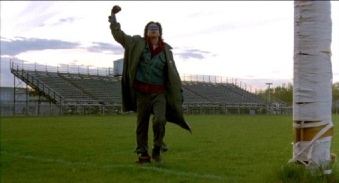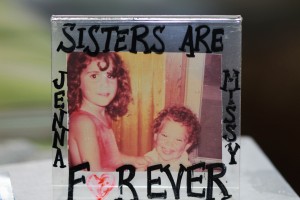
When I was a ‘tween, I had a dear friend named Gwen. We were two oddballs. While other girls our age were boy crazy, Gwen and I were obsessed with the Broadway musical Cats. We knew all of the songs by heart, purred and arched our backs and strutted together, licked our paws.
When we were not quite old enough, Gwen and I watched The Breakfast Club. John Hughes at his finest. The princess, the athlete, the criminal, the brain, and the basket case: Five students with seemingly nothing in common spend a Saturday afternoon together in high school detention and learn they are more similar than they thought. Anyone who watched the movie could identify with one or more of the archetypes. Either they were one of the popular kids – the beautiful rich girl or the clean-cut jock – or they weren’t for one reason or another – too smart, too poor, too weird.
I was dazzled by Claire’s sense of style, her effortless beauty, the way she danced; intimidated by the arrogance of Andrew the athlete and John the criminal; cautious of Allison, the basket case. I identified most with Brian, the awkward bookworm who took academic failure far too seriously. In its oversimplified way, The Breakfast Club acknowledged the unwritten rules of high school society, what determined which social caste you fit into. After the film was over, however, we never saw what happened to the characters 20 years later.
Gwen and I stayed friends for about another year before she ended our friendship; her family moved away shortly thereafter and she attended a different school. Losing a friend in this way was not new to me. During the previous 2 years, I was (for lack of a better word) dumped by several other girlfriends. The friend who drifted away the moment we moved from our small elementary school to the larger middle school where through some secret ritual she emerged as one of the popular girls; the friend who called to inform me we were no longer best friends because that position was now occupied by her cooler cousin who’d recently moved into town; the friend who had a crush on the boy who in turn had a crush on me, thus ending our friendship, but not before she spread a rumor that I stuffed my bra; and the group of girls who called en masse to let me know I was being let go and that they collectively thought I needed “mental help.”
At the time, I was most troubled by the rejection and the loneliness. Like everything else, though, they passed and weren’t all bad as they definitely contributed to the introverted, sensitive, and thoughtful person I am today. What lingered, however – and what sometimes troubles me to this day – was never knowing what I had done, what made me so unilaterally intolerable to those I held closest. I suppose there are a number of explanations: maybe I was a jerk, maybe my friends were mean girls, or maybe I happened to be a repeat casualty of the fickle teenage years. Regardless of the cause, the result was the same.
Soon after my friends separated themselves from me, I began drinking to fit in with a different crowd. (This is not to blame anyone for my drinking; I could have picked up physics or community service, but I chose instead to drink.) And drinking became my way of coping, with uncertainty, with social anxiety, with loneliness. It worked…for a while.
Since I quit drinking nearly 5 years ago, one of my greatest challenges has been dealing with the same uncomfortable feelings without the buffer of alcohol. My meditation practice has offered me the opportunity to face these feelings without cutting myself off from them. Meditation encourages me to lean into the discomfort, to become curious about it, and to look at it squarely without rose-colored glasses or the stink eye.
Recently, I attended my 20-year high school reunion. In the days leading up to the reunion, I prepared myself for every possibility: who I might see, what feelings might arise, and how I could react. Walking in that night, I felt fairly grounded. What I was not prepared for, however, was seeing Gwen, who all but disappeared when she ended our friendship and who didn’t even graduate with us.
Seeing her brought back all of the uncertainty, the insecurity, and the unsettling feelings I tried to put to rest. But in that moment, I recognized what I was feeling, acknowledged it without reacting or repressing, and let it go. I moved past Gwen and into a room filled with other nervous, excited, and nostalgic people (most of whom had a drink in hand).
Surely I wasn’t the only one there with insecurities or unanswered questions, but most of us seemed to check those at the door. Conversations focused on what we were doing now: home, work, kids, families. Part of the beauty of a 20-year reunion is that you forget most of the reasons you were friends with one person but not another. What remains is the familiar outline of someone’s face – perhaps with a few extra lines or gray hairs – and the knowledge that we shared an experience a while back. As adults, most of us learned that kindness, compassion, and curiosity are more important than being one of the cool kids. One of my former classmates exclaimed, “I wish things were like this 20 years ago!”
Before I left the reunion, I spoke with an old friend and congratulated her on all the wonderful things she had achieved since we left high school. I still haven’t forgotten her response. She said that people never seem to miss a chance to remind you of your mistakes, but that every one of them was necessary and brought her to where she is now.
NOW being the operative word. I guess we could all say that.

image credit 1
image credit 2
Share this:
-
Facebook
-
-
Reddit
-
Email
-
-
Print
-
Like this:
Like Loading...
Read Full Post »




